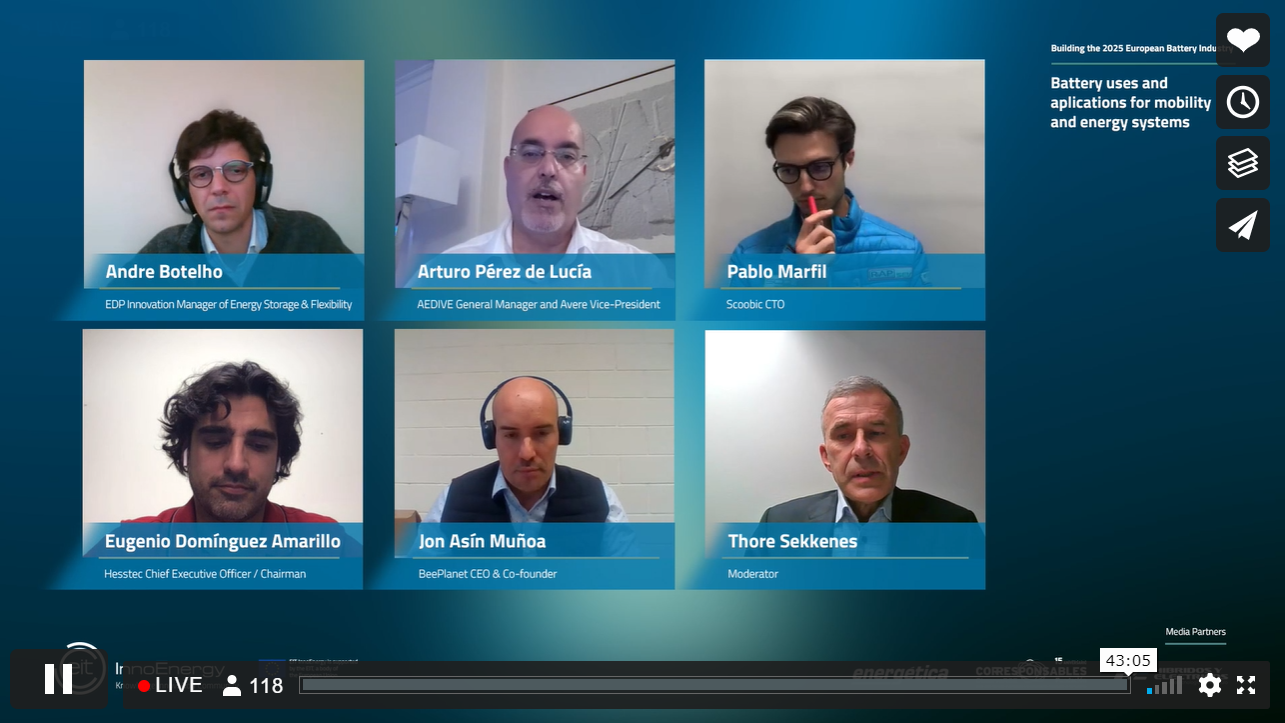Spain and Portugal play a key role in the EU battery value chain

The first Iberian Battery Summit, organised by EIT InnoEnergy demonstrated the fundamental role that Spain and Portugal play in the development of the value chain related to electric batteries in Europe. EIT InnoEnergy, the European engine of innovation and entrepreneurship in sustainable energy, has organised this summit, to which more than 600 registrations and which has taken place for three consecutive weeks (from November 25 to December 15). The event had the participation of great personalities such as Maroš Šefčovič (Vice-president of the European Commission), João Pedro Matos Fernandes (Minister of the Environment and Energy Transition of Portugal), Raül Blanco (Secretary General of Industry and SMEs in the Ministry of Industry, Commerce and Tourism) and Professor Michel Armand, a scientist at CIC energiGUNE and considered one of the fathers of lithium batteries.
Iberia & Batteries
From the raw material extraction projects in Spain and Portugal, through the innovative initiatives and their practical applications, the most promising initiatives related to mobility or the role of researchers and their latest technological discoveries – all the main players in the sector of batteries have gathered at this event to present their vision and to discuss the future of the sector. Precisely, this summit has shown that Spain and Portugal have become a key area for Europe to make the transition from fossil fuels to renewable energy. The goal is to convert the Old Continent into a self-sufficient area that can generate efficient batteries and with applications not only in energy but also for mobility. All this within the framework of the European Battery Alliance (EBA250), promoted by the European Commission in 2017, aiming to face this enormous industrial challenge and which is managed by EIT InnoEnergy.
Mikel Lasa, CEO of EIT InnoEnergy Iberia:
“In these sessions, we have been able to discover that we have all the ingredients that the industry requires for the transition to clean energies and for the creation of a competitive industry around batteries. We have raw materials, local market demand, powerful and innovative business initiatives and the knowledge and capacity to become a fundamental piece in the European strategy ”, declared the CEO of EIT InnoEnergy Iberia, during the closing of the meeting.
The potential of the region
The Iberian Peninsula is the second largest automobile manufacturing region in Europe, as well as a leading area in terms of renewable energy generation and industrial supply. For this reason, it has a unique opportunity to capture part of the market for electric batteries whose value is estimated at 250,000 million euros per year from 2025. As has been made clear in the different sessions of this summit, to materialize this, it will be key to have the participation and collaboration between the different parties involved in the entire battery value chain.
Participation of more than 20 institutions and business
The event had four online sessions that have taken place from December 25 to 15 and where the different perspectives of different institutions and business initiatives have been presented – European Commission, Ministry of Industry, Commerce and Tourism of Spain, Ministry of Environment and Energy Transition of Portugal, Iberdrola, EIT Raw Materials, EDP, Scoobic, HessTec, AEDIVE, BeePlanet, Phi4Tech, Basquevolt, NABATT, Power Electronics, Savannah Resources, Infinity Lithium, Lithium Iberia, EIT Raw Materials, IREC, Tecnalia, Colab Vasco de Gama, INL and CIC Energigune.
“Battery uses & applications” Session
The opening session made it clear that Europe’s commitment to the battery sector is not only a political statement, but that all the available means and the necessary resources are actually being used for it. It was also found that, both in Portugal and Spain, there is a great opportunity to develop business around batteries with applications in two specific markets where precisely these two countries are already well established: the automotive sector and energy.
“Cells & Battery Packs Production” Session
The second day revealed the enormous demand for batteries that can be generated from the automotive sector. The Ministry of Industry recognised that the battery and electromobility sector will be one of the industrial strategic bets for Spain in the coming years and, to achieve this, the Government will mobilize a significant amount of funds and resources. On the other hand, the European Battery Alliance also recalled that it is ready to support projects that make business sense and that contribute to the European objective of building a new industrial value chain around batteries.
“Raw & Active Materials” Session
One of the sessions that stirred more expectation was the one related to raw materials. During this session, the representatives of the lithium extraction and production projects, that are underway in the Iberian Peninsula, were able to advance their plans and comment on the status of their various initiatives. During the round table, the spokespersons for Litihium Iberia, Infinity Lithium and Savannah Resources defended the environmental viability of their proposals since they would reduce the carbon footprint that currently depend on the transport of raw material from other continents to Europe. They also recalled that electric mobility requires a “green revolution” that involves making this type of mining projects possible. The experts also recalled that mining activities in the 21st century in Europe are modern 4.0 industries that involve and require a lot of cutting-edge technology and that need to comply with strict environmental, health and safety regulations. In addition, having its own resources in the Peninsula is an advantage that cannot be replicated in other areas and that, without a doubt, can attract other valuable industrial projects related to the battery chain. The Portuguese Minister Matos Fernandes himself declared that his government is already supporting this type of project and is working to attract new ones to the region.
“Batteries of the future” Session
The fourth session made it clear that the sector requires research and technological innovation to remain competitive and that, in return, researchers need the industry to make their work relevant and meaningful. Iberia has the knowledge and technological capabilities necessary to produce safer, lighter and more environmentally sustainable batteries, at a lower cost, with higher capacity and a longer useful life. This knowledge is essential to accelerate the penetration of electric vehicles and renewable energies and to make the industry more competitive.

